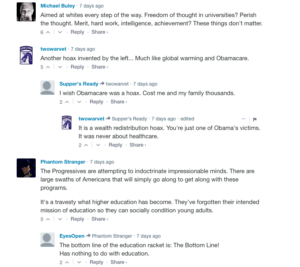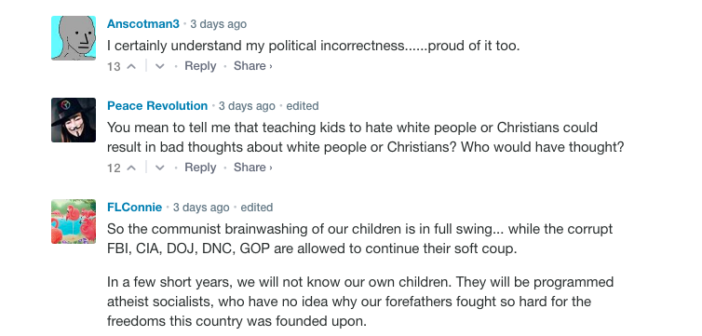Can mandatory diversity training be a form of indoctrination?
A one-hour course dealing with discussing and targeting everyday acts of racism has left a torrent of article comments on Breitbart.com from individuals not even connected to North Central. One comment says, ” ‘higher education’ is nothing but leftist indoctrination now. They learn NOTHING useful.”

The comment section of the Breitbart article.
Those commentators are claiming higher education is a leftist campaign, diversity training is indoctrination and being politically correct is an act of horror. One commenter states that “I am a Red Neck. Being Politically Incorrect defines me, it is my culture.”
At the start of the academic year, the school came out with a mandatory diversity, equity and inclusion training module.
Every student had it uploaded to their Blackboard accounts and were told to complete it.
In the next few weeks, professors will take a similar one targeted more toward teaching and education.
An article and a radio interview with Breitbart came out on Aug. 28 that interviews a North Central student, Hope Flynn, ’22, about some of the perceived negatives of the training.
“Most of it was obvious information that we all know or is like ‘no duh’ information. The stuff that didn’t sit well with me was the privileges aspect of it like naming your privileges,” said Flynn.
While the training works to make people aware and have conversations about everyday microaggressions and acts of bias, Flynn stated in the Breitbart article that “she found the concept to be ‘ridiculous,’ as she feels most people already inherently avoid being offensive as a common courtesy in society.”
Dr. Stephen Caliendo, dean of the College of Arts and Sciences, rejects the idea that a bias training module is a form of indoctrination or a tool to change people’s opinions.
“I think by calling it indoctrination it takes away the agency of people who are involved, in this case, the students. It’s not that easy to get in here as a student … these aren’t people who are so dumb they can be brainwashed by an online module,” said Caliendo.
Caliendo said that the module was a way for students to get a baseline of information and language to have more meaningful conversations. After the previous year at North Central had numerous racial bias incidents, it was a way to start a new discussion.
“We had some high-profile incidents of racism on our campus last spring that were simply symptoms of longer-standing issues that happen on college campuses, particularly primarily white institutions like North Central,” said Caliendo.
The training asks questions that may be considered private. But does this information go anywhere beyond the screen?
“Just because it was tied to our accounts I know that the entire time they said it was anonymous, but they were asking really personal questions and it was required,” said Flynn. “So I know they know which students have and haven’t done it. It’s concerning to me that it is very personal information, so how do we even know that it is anonymous.”
Some of the concerning private material includes information like religion, gender, sexual orientation, privileges, etc.
The training program comes from a third-party vendor that is not connected to the school. Caliendo said that the college will only receive back two pieces of information. That is if the student started the module and if they completed the module.
“We don’t have any access to the data or what students wrote in them. The student interviewed said that there were parts of it that she just didn’t do and that’s perfectly fine,” said Caliendo.
How did Breitbart, a popular far-right conservative hotspot, get into contact with a student from a small liberal arts college in Naperville?
Flynn is the president of North Central’s Turning Point USA chapter, which isn’t officially considered a school organization yet. The regional director and his boss reached out to Flynn to appear on Breitbart’s weekly show that features a different Turning Point USA guest every time.
Dorothy Pleas, assistant dean of students and director of multicultural affairs, said the module has been in the works for at least a year, in part because it was something that students from the Black Student Association were asking for. The module takes about an hour to complete and asks questions regarding identities, microaggressions, privilege, etc.
“(The module) asks about people’s different types of identities and to share identities that are visible or invisible parts of their identity … It’s not required that students give their race or ethnicity,” said Pleas.
Pleas said she is open to questions regarding why this training has to be done at all and is accepting of this dialogue. She said often things that are deemed as mandatory can come with some backlash.
“Another problem with the diversity training is that it labels people based on stereotypes or assumptions (which was ironic because the module discussed the issues with that) and doesn’t give leeway for getting to know people or giving people the benefit of the doubt. It also creates victimhood in areas and among people who had no idea they should feel like a victim,” said Flynn.
Joshua Simmons, ’20, former president of the Black Student Association, said that the training sets the groundwork for more work to come.
Simmons said the point of the training was to make all participants aware of certain biases they may hold. Not to just call out people who are actively racist, but to make us aware of the unconscious biases we may hold.
“I think the interview was very ignorant and showed a lack of understanding,” said Simmons.
Simmons said the article reminded him of “white fragility.” This basically means that some white people tend to get uncomfortable and remove themselves from conversations with race, especially when they feel attacked.
“The (Breitbart) article was poorly written … If you’re going to put out an interview about feedback for a training model, there should be input from more than one person, especially more than just one white person,” said Simmons.
To say that there is controversy over this training module may suggest a greater groundswell than is actually present. Steve Macek, professor of communication, said that very few chapters of Turning Point USA actually have large memberships. He also added that Turning Point USA has reportedly paid to support conservative student government candidates on some U.S. campuses.
But what’s the connection between Breitbart and Turning Point USA? Mostly, ideology and reputation.
Macek said that Breitbart started out as an ultra-conservative and unethical place to spew information.
“It is a cesspool of hate speech. It has nothing to do with journalism,” said Macek. “They set it up to be a Huffington Post of the right … They have no professional ethics or journalistic ethics. Breitbart makes no pretense of being balanced or fair. They have a right-wing ax to grind.”
Their reputation for content that is problematic, such as conspiracy stories like Pizzagate and Obama birther myths, is incredibly dangerous in an era documented by top law officials claiming white supremacists are an increasing risk to safety.
“I feel sorry for the student who spoke with Breitbart, she may very well have had the best intentions but she doesn’t realize the sleazy people she got into bed with,” said Macek.
Turning Point USA has been involved in some controversial activity in some of its other locations throughout the country. At the end of the day, the First Amendment allows students the right to be in organizations and exercise their freedom of opinion.
“The proper response is not to try to shut up the student,” said Macek. “I hope the administration doesn’t take any steps to silence or punish her in any way for talking to Breitbart.”
A part of the discomfort with the school discussing racial incidents and diversity is growing uncertainty over political correctness. There is a growing trend of higher education being called “overly liberal.” The issue with political correctness may just be an ethical one.
“Political correctness is a word used by people who don’t want us to be so worried about other people’s feelings, they don’t want us to be so empathetic,” said Caliendo. “I think it’s a core value of who we are at North Central College and we do care about each other and want to have a welcoming environment.”
Turning Point USA has made other colleges and even professors feel anything but part of a welcoming environment in their classrooms.
With Turning Point USA being behind a professor watchlist for teachers they believe to “advance a radical agenda in lecture halls,” it feels like professors are under an impending threat.
“I am the president of the campus chapter of the American Association of University Professors and while we believe they have the right to start whatever group they want … we will be keeping a close eye on them because historically they have posed a threat to the academic freedom of faculty,” said Macek.
Editor’s note: A statement attributed to Dr. Steve Macek regarding Turning Point USA funding college chapters has been updated to reflect that Turning Point USA has reportedly paid to support student government candidates on some U.S. campuses.
https://www.chronicle.com/article/Inside-a-Stealth-Plan-for/240008

